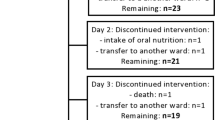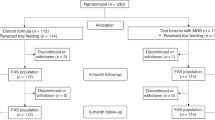Abstract
Objective: To evaluate if simply increasing the energy density of the formula will lead to increased energy intake and weight gain in infants with non-organic failure to thrive.
Design: In this hospital-based trial, 15 infants (mean age, 7.6±1.4 months) with non-organic failure to thrive were fed a regular strength formula (2.8 kJ/ml) for 3 days and then switched to the same formula with a higher energy density (4.18 kJ/ml) for 3 days after a 2 day ‘wash-out’ period. Daily nude weights and energy intakes were recorded for the two 3 day periods.
Results: During feeding with the higher density formula, nine (60%) infants had a significant increase in their energy intake and weight gain (both P<0.02); four (27%) showed no change in energy intake and self-regulated their intake by decreasing the volume of feeds consumed to maintain energy intake; and two (13%) infants consumed a significantly reduced amount of energy (P<0.02).
Conclusion: Increasing the energy density of the formula may provide a useful intervention to increase the weight gain and energy intake of most infants with non-organic failure to thrive.
This is a preview of subscription content, access via your institution
Access options
Subscribe to this journal
Receive 12 print issues and online access
$259.00 per year
only $21.58 per issue
Buy this article
- Purchase on Springer Link
- Instant access to full article PDF
Prices may be subject to local taxes which are calculated during checkout
Similar content being viewed by others
References
Berwick D, Levy J, Kleinerman R . 1982 Failure to thrive: diagnostic yield of hospitalization Arch. Dis. Child. 57: 347–351
English P . 1978 Failure to thrive without organic reason Pediatr. Ann. 7: 774–781
Fomon SJ . 1974 Normal growth, failure to thrive and obesity In: Infant nutrition Philadelphia, PA: WB Saunders
Fomon SJ, Filer LJ Jr, Thomas LN, Rogers RR, Proksch AM . 1969 Relationship between formula concentration and rate of growth of normal infants J. Nutr. 98: 241–254
Homer C, Ludwig S . 1981 Categorization of etiology of failure to thrive Am. J. Dis. Child. 135: 848–851
Sills RH . 1978 Failure to thrive: the role of clinical and laboratory evaluation Am. J. Dis. Child. 132: 967–969
Wright P . 1987 Hunger, satiety and feeding behaviour in early infancy In: Eating Habits: Food, Physiology and Learned Behaviour Chichester: Wiley
Author information
Authors and Affiliations
Corresponding author
Rights and permissions
About this article
Cite this article
Khoshoo, V., Reifen, R. Use of energy-dense formula for treating infants with non-organic failure to thrive. Eur J Clin Nutr 56, 921–924 (2002). https://doi.org/10.1038/sj.ejcn.1601406
Received:
Revised:
Accepted:
Published:
Issue Date:
DOI: https://doi.org/10.1038/sj.ejcn.1601406



